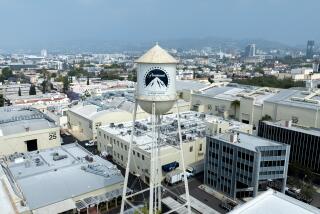Turner Sells Fabled MGM but Keeps a Lion’s Share
The familiar Metro-Goldwyn-Mayer signs will come down from the historic Culver City studio that was an integral part of the MGM image and Hollywood itself.
And broadcast entrepreneur-sportsman Ted Turner, who acquired MGM less than three months ago, will not become a major movie mogul after all--but he will end up with its movie library of 2,200 pictures.
Those are the results of a $490-million pair of “agreements in principle” announced Friday that mean another major change in the face of Hollywood.
Details of Breakup
The breakup of the studio, where “The Wizard of Oz” and a host of other cherished pictures were filmed, involves the following:
--The 44-acre MGM studio property, along with its film-processing laboratory, will be bought for $190 million by Lorimar-Telepictures Corp., a major television firm that presently occupies rented quarters on the lot.
--The famous MGM name and Leo the Lion logo will go with its motion picture and television production and distribution and home video businesses for $300 million to United Artists Corp. UA, which until March was the other half of MGM/UA Entertainment Co., said MGM will continue as a separate “production grou.” A spokesman for UA controlling share- holder Kirk Kerkorian said it has “not been decided” whether to incorporate MGM again into the corporation’s name.
--Turner Broadcasting Co., controlled by Turner, will keep the fabled MGM film library, primarily as a source of programming for its Atlanta superstation WTBS. Turner would end up spending $1.2 billion for the library, apparently a record outlay for that type of “product,” as it is called in the entertainment business.
Although the cachet of MGM’s movies in recent decades has not been able to live up to its pre-1960s image, some movie buffs were already mourning the prospective dispersal of a major chunk of glamour in the industry.
The old MGM has lived on chiefly in its movie library. One of its best-known classics, “Gone With the Wind,” actually was produced by Selznick International with one of the film’s top stars, Clark Gable, borrowed from MGM. MGM distributed the film and later bought it.
Along with the array of MGM musicals and other hits, the library includes many old Warner Bros. and RKO pictures.
MGM Bought March 25
Turner, who has owned MGM only since March 25, had said many times that his primary objective in buying MGM was to acquire its library.
He also said repeatedly that his firm was negotiating to sell any and all of the remaining assets to cope with the mountainous debt it took on to acquire MGM.
Even so, Turner confessed to having been smitten at least somewhat by the movie-maker syndrome and insisted on a condition that the buyers would distribute three movies that he might produce in the future.
Lorimar-Telepictures Chairman Merv Adelson confirmed Friday that his firm did agree to do so “as long as he pays the costs involved.” Turner indicated in a speech here earlier this week that he is interested in a strong anti-nuclear picture and other “pro-social” subjects. UA spokesman Andy Fogelson said he did not know if UA made a similar commitment.
Library Cost $1.2 Billion
A source at Drexel Burnham Lambert, Turner’s investment banker, said Turner’s total cost before selling the assets was about $1.7 billion, which included the MGM debt acquired with the company in March. Friday’s announcement means that the library cost Turner $1.2 billion. The source said Turner is getting a good return on that outlay since the MGM library brings in about $100 million every year.
The Culver City lot in the future will bear the name of Lorimar-Telepictures only, and MGM is expected only to rent sound stages for future productions, according to Adelson.
Acquisition of the property will give Lorimar-Telepictures a good return on its investment while allowing the company to consolidate its scattered facilities under one roof, he said.
New UA Chairman Lee Rich said both UA and MGM production groups will “remain separate and active” and will “supply product to one central marketing and distribution facility.”
Stephen Silbert, a spokesman for UA controlling shareholder Kerkorian, noted that the company is acquiring a picture production company with movies in the pipeline, including the current hit “Poltergeist II,” as well as “Fame” and other television properties and two “incredible” assets: the MGM logo and its prosperous home video business.
Entertainment analyst Harold Vogel of Merrill Lynch said he sees no reason for surprise at the deal, observing that, to a large extent, Kerkorian “is buying back what he owned before.”
Turner Broadcasting has “more breathing room” on its debt, Vogel said, while Kerkorian “made a healthy profit, I’m sure.”
Friday’s long-awaited announcement on just what Turner would sell came after interest was expressed by many potential buyers, the Drexel Burnham source said. Among the first formal bids was that of financier Charles Knapp’s Trafalgar Holdings. Trafalgar spokesman Don Reynolds said Friday that it bid slightly less than $400 million for all the MGM assets except the library.
Times staff writer Kathryn Harris contributed to this report.
More to Read
The biggest entertainment stories
Get our big stories about Hollywood, film, television, music, arts, culture and more right in your inbox as soon as they publish.
You may occasionally receive promotional content from the Los Angeles Times.










